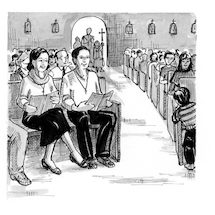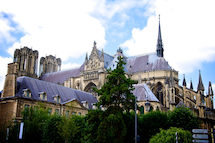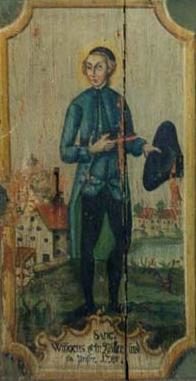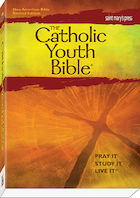Weekly Winner
Congratulations to Lorenzo Cano, our winner for November 3rd!
Lorenzo will receive a copy of The Catholic Youth Bible®, a $27.95 value.
The Catholic Youth Bible® will be a true companion, helping you find the answers you seek and helping you make connections to Catholic beliefs and traditions.
Over 700 lively articles help you . . .
- Pray It! Use the Bible for personal prayer.
- Study It! Understand and make sense of what the Bible says.
- Live It! Apply the Bible to real-life situations you're facing now.
This New Edition Features:
- New! 40 expanded "Catholic Connection" articles that provide a more complete presentation of those Catholic teachings that are scripturally based
- New! 28 articles that address the seven principles of Catholic social teaching
- New! 40 pages of four-color inserts that help you pray, study, and live the Bible and Catholic teachings
- New! Illustrations throughout to provide a visual context for the biblical stories
- New! Over 275 articles updated to reflect contemporary issues and biblical scholarship
Plus:
- Introductions to the major sections of the Bible and all the books of the Bible
- Biblical connections to many different cultures, illustrating the universality of the Catholic Church
- Insights into how the Church has interpreted key Scripture passages throughout history
- A glossary of Scripture-related terms
- Five special indexes; Sunday readings for cycles A, B, and C; 10 color maps; a four-page color timeline; and three pages of full-color biblical art
The Catholic Youth Bible®
ISBN: 978-1-59982-141-2, paper, 1802 pages
Focus on Faith
Three Cheers for Your Local Church!
by Joanna Dailey
 Lately, I happened to drop in on the Web site of the local diocese of my childhood and high school years, the Diocese of Gary, Indiana. I also took a peek at the Web site of the diocesan newspaper, the Northwest Indiana Catholic. I can now say definitely that all three of us (the diocese, the newspaper, and I) have made it to the 21st century.
Lately, I happened to drop in on the Web site of the local diocese of my childhood and high school years, the Diocese of Gary, Indiana. I also took a peek at the Web site of the diocesan newspaper, the Northwest Indiana Catholic. I can now say definitely that all three of us (the diocese, the newspaper, and I) have made it to the 21st century.
There is no question that the Diocese of Gary is one of the grittier pastures in the Lord’s Kingdom. The Diocese of Gary: bounded on the north by Lake Michigan and the local/national steel and oil industries (ah! Lake Michigan! We could never swim in it in our area without getting flecks of oil on our bathing suits so we took the rare opportunity to get to a Chicago beach if we could), bounded on the west by the suburbs of Chicago, bounded on the east by industrial complexes and the City of Gary itself, and bounded on the south by fields of corn and soybeans (hello, rural friends and relations!) now being taken over by suburbs. And all ringed by expressways leading to the four corners of the earth.
The Diocese of Gary is, to quote its Web site, "diverse but one in faith." How like the Church itself. There were times, I admit, when I wished I were from some place other than Hammond, Indiana. I have cousins who are from Santa Barbara, California. Wouldn’t it be nice to be from Santa Barbara, California? But no. As Popeye says, "I am what I am," and the fact that the author of A Christmas Story (remember Ralphie, who stuck his tongue to the flagpole?) was raised in Hammond, Indiana, and based that story on his life there, made it all better for me. The author Jean Shepherd and I have something in common! (They shot most of the movie in Ohio, however. Oh, well.)
Meandering over to the Northwest Indiana Catholic Web site, I was struck not only by the excellent articles and photos but by a little tab in the left margin labeled "The Recipe Box." What are they making up there in northern Indiana these days? White Chicken Chili, Best Cornbread Ever, and Caramel Pecan Tart. I must admit I was expecting something like Sausage and Sauerkraut, Stuffed Cabbage, and Potato Pancakes, but hopefully these signature dishes of my childhood will come around at some point. Can’t wait to try the Pecan Tart!
Potato pancakes are exactly the same thing as latkes, which Jewish people make for Hanukkah. I did not realize this until I was working at a hospital in the Bronx and having lunch every day at the Albert Einstein College of Medicine next door. When the eight days of Hanukkah came around in December, potato pancakes were on the menu every day! Oh, joy! Later, on a visit back to Hammond, I asked my mother why she cooked Jewish food. She answered, "It’s all Eastern European. It’s all the same."
Why am I telling you all this? Because where you are from is important. (See "Make It Happen" in this newsletter.) The opportunities offered by your own diocese to grow in faith, to join in efforts to help the disadvantaged, and, yes, to share local dishes, are opportunities in which you will find—guess who: Jesus. (Don’t get me started on Jesus and meals.) "For where two or three come together in my name, I am there with them" (Matthew 18:20, GNT).
So, have a seat. Try a few potato pancakes. Applesauce? Sour cream? Both?
Blessings on your ministry!
Peace and joy,
Joanna
Make It Happen
Research Your Local Church
 Give your students the opportunity to research your local church—its history, its bishop, its cathedral, its work of supporting parishes and its charitable outreach. You might make a list of the tabs on your local diocesan Web site and use those as your categories of research. Some examples taken from the Web site of the Diocese of Gary: Bishop’s Office, The Cathedral, Directory of Offices, Vocations, Parishes, Clergy, Catholic Schools. Of course, each of these has subsets. The Directory of Offices is quite extensive, each one deserving of a report!
Give your students the opportunity to research your local church—its history, its bishop, its cathedral, its work of supporting parishes and its charitable outreach. You might make a list of the tabs on your local diocesan Web site and use those as your categories of research. Some examples taken from the Web site of the Diocese of Gary: Bishop’s Office, The Cathedral, Directory of Offices, Vocations, Parishes, Clergy, Catholic Schools. Of course, each of these has subsets. The Directory of Offices is quite extensive, each one deserving of a report!
You might find it possible to take a field trip to your cathedral in connection with a retreat afternoon or other event for youth taking place there. The cathedral is "everyone’s church" but, unfortunately, unless one is invited to attend the consecration of a bishop or the ordination of a priest, many people have no occasion to visit. (Of course, candidates in the RCIA are asked to be present in the cathedral when invited to the Easter sacraments, but, again, this group may not include a great number of high schoolers.)
Chronicling the growth of faith in your local area is one way to help your students realize that their Catholic faith, which was so important to their ancestors in faith, can be just as important and valuable to them, too.
Break Open the Word
Feast of the Dedication of the Lateran Basilica in Rome, Thirty-Third Sunday in Ordinary Time
Feast of the Dedication of the Lateran Basilica in Rome
November 9, 2014
John 2:13-22
Opening Prayer
Jesus, give us the spiritual discipline to be ready for you at all times, whether you come at an ordinary moment in the day or at the end of time in glory. Amen.
Context Connection
At the time of Jesus, the center of Jewish worship was in Jerusalem, at the Temple. By Jewish tradition, it was God’s dwelling place on earth. On certain feast days, Jews would travel to Jerusalem to celebrate special events at the Temple. As a devout Jew, Jesus went to Jerusalem to celebrate the feast of Passover, to recall how Yahweh freed the Jewish people from their slavery in Egypt.
The Temple, at the time of Jesus, was being reconstructed. In 587 BC, the Babylonians destroyed the original Temple that King Solomon had built around 966 BC. The passage from John says that the reconstruction had been under way for forty-six years (see verse 20) and that it was not yet complete. When you read this passage, you might wonder why there are money changers and people selling oxen, sheep, and doves in the Temple. The money changers are exchanging coins bearing effigies—coins with faces of people or gods on them—for Tyrian coins, which have no effigies of any kind on them. They do this because Jews are not allowed to pay the Temple tax (the annual tax of a half-shekel) with effigy coins; coins bearing a face are understood to be a violation of the commandment against graven images. The tax goes toward the upkeep of the Temple. Sometimes the money changers charge an exchange fee, thus profiting from their transactions.
The people selling sheep, oxen, and doves are supplying Temple-goers with animals to be ritually sacrificed, according to Mosaic Law. Rather than bringing animals from home, people who have to travel a great distance to the Temple often purchase animals when they arrive. In short, the money changers and the people selling animals are providing services of convenience.
Tradition Connection
On November 9 each year, the Catholic Church has a feast of the Dedication of the Lateran Basilica, which is the cathedral of Rome and, therefore, the cathedral of the Bishop of Rome, the Pope. The Latin phrase "Omnium urbis et orbis ecclesiarum mater et caput," translated as "Mother and head of all the churches of the city and of the world," is written on the walls of the basilica. Encased within the present stone altar is a wooden one that tradition says was the altar Saint Peter used to celebrate Mass. The palace that was originally attached to the Lateran Basilica was the official residence of the popes from the fourth century until the return of the pope from Avignon in the fifteenth century. Since then, the popes have resided in the buildings attached to Saint Peter’s Basilica. The Lateran Basilica is the oldest of the great basilicas in Rome.
Why do we say we are temples of the Holy Spirit? Why not say we are churches or cathedrals of the Holy Spirit? In John 2:19, Jesus says, "Destroy this temple and in three days I will raise it up." Those who hear him think he is speaking about the Temple in Jerusalem that is being reconstructed, but Jesus is speaking about his own body as a temple, as a sacred dwelling place of God’s glory. In John 2:22, we read that only after Jesus has been raised from the dead do the disciples understand his words. No doubt this also means they don’t fully understand what Jesus means about being a temple until they too are filled with the Holy Spirit.
Wisdom Connection
This week’s Gospel reading draws an interesting parallel between Jesus and the prophet Jeremiah. In chapter 7 of the Book of Jeremiah, the young prophet is in the Jerusalem Temple before the Babylonians destroy it. He proclaims that the Temple is the Temple of the Lord and that it should not be made into a den of thieves. Jesus says, "Stop making my Father’s house a marketplace!" (John 2:16). Jeremiah is warning the people who are living divided lives. Those people perform the required rituals and believe they are safe as long as the Temple remains standing, but they also do many things contrary to the Ten Commandments. They do not feel any need to change the way they are living.
In the Gospel, it is not clear why Jesus is angry with the money changers and the people selling animals. Perhaps they are cheating people by raising the prices on the animals and charging high exchange fees to those needing the appropriate coins for the Temple tax. Whatever the reason, Jesus believes those individuals collectively represent a great source of injustice. He refuses to passively stand by and do nothing in the presence of such injustice. Instead, he chooses a course of action that clearly speaks out against the injustice.
What injustices remain today that we can raise our voices against so that they are addressed and corrected?
Acknowledgments
The scriptural quotations contained herein are from the New Revised Standard Version of the Bible, Catholic Edition. Copyright © 1993 and 1989 by the Division of Christian Education of the National Council of the Churches of Christ in the United States of America. All rights reserved.
Thirty-Third Sunday in Ordinary Time
November 16, 2014
Matthew 25:14-30
Opening Prayer
Jesus, we hear you calling us to boldly live our faith by sharing it with others. Fill us with your grace so we can overcome our fear to take risks and our inclination to bury that precious gift of faith because it's the easiest, safest thing to do. Amen.
Context Connection
This Sunday's Gospel tells the story of a wealthy man who, before setting out on a journey, entrusts his wealth to three servants. To the first servant he gives five talents, to the second servant two talents, and to the third servant one talent. A talent, by the way, was both a sum of money and a measure of money. Scripture scholars tell us that a talent was equivalent to the wage a day laborer would have earned in fifteen years. A talent, therefore, was a sizable amount of money, and everyone would have understood its value or worth. We find out from the story that the first two servants take the money entrusted to them and double it through hard work, but the last servant takes the money and buries it in the ground. Hiding money or valuables in the earth was typical in Jesus' day. Archaeologists are continually uncovering jars of coins throughout the Holy Land and elsewhere. Fear rather than gratitude may have motivated the third, or last, servant to bury the money entrusted to him; perhaps this servant knew that the wealthy man, at a future date, would ask him to make an account of the money. That is exactly what happens, "After a long time the master of those slaves came and settled accounts with them" (25:19). This verse suggests that the master was more concerned with how they had lived their lives than how they had spent or invested their money, which prefigures the Last Judgment, when Jesus returns to judge his followers on the totality of their actions.
When the master comes to the first servant, to whom he had given five talents, the servant produces five additional talents; the servant to whom he had given two talents produces two more. The master praises them, saying, "Well done, good and trustworthy slave; you have been trustworthy in a few things, I will put you in charge of many things; enter into the joy of your master" (25:23). The joy of the master refers to sharing in his material wealth or abundance. Similarly, the joy of our Master, Jesus Christ, refers to sharing in his spiritual wealth, that is, the Kingdom of Heaven. When the master comes to the third servant, to whom he had given one talent, the servant tries to justify why he buried the talent, which had everything to do with his fear of taking a risk. The servant says, "Master, I knew that you were a harsh man, reaping where you did not sow, and gathering where you did not scatter seed" (25:24). The master then confronts the servant, calling him wicked and lazy. Because this servant did not use the money entrusted to him in a productive way, the master takes it away from him, thereby denying him the opportunity to share in his joy. In fact, he will experience just the opposite: he is thrown "into the outer darkness, where there will be weeping and gnashing of teeth" (25:30).
This story is about servants (disciples) being entrusted with the gift of faith, which is to be shared with others through positive actions, not selfishly hoarded. We will hear more about the positive actions that Jesus expects of his disciples in Matthew 25:31-46, which is next Sunday's Gospel.
Tradition Connection
Through the Paschal Mystery, the death and Resurrection of Jesus, we believe that humankind can once again pass into the eternal mystery of heaven, which is the point of culmination for all who believe in God and give witness to that belief throughout their lives.
By his death and Resurrection, Jesus Christ has "opened" heaven to us. The life of the blessed consists in the full and perfect possession of the fruits of the redemption accomplished by Christ. He makes partners in his heavenly glorification those who have believed in him and remained faithful to his will. Heaven is the blessed community of all who are perfectly incorporated into Christ (Catechism of the Catholic Church, paragraph 1026).
Heaven is the fullness of life in the Holy Trinity, the loving community of the Father, the Son, and the Holy Spirit. This communion of God will be shared by all the saints and angels. Heaven is where our deepest human longings as well as the restlessness of our soul will be fulfilled; it is a place of happiness.
"This perfect life with the Most Holy Trinity—this communion of life and love with the Trinity, with the Virgin Mary, the angels and all the blessed—is called 'heaven.' Heaven is the ultimate end and fulfillment of the deepest human longings, the state of supreme, definitive happiness" (Catechism, paragraph 1024). Heaven is one of the most profound mysteries of our faith. Many spiritual persons throughout history, whom we call mystics, have tried to express in words both their insights and visions of heaven, which they gained through prayer and meditation. But they tell us human words fail to describe the fullness and depth of the mystery of God and heaven. The Church has given a name to the contemplation of God in his heavenly glory, "the Beatific Vision." "This mystery of blessed communion with God and all who are in Christ is beyond all understanding and description. Scripture speaks of it in images: life, light, peace, wedding feast, wine of the kingdom, the Father's house, the heavenly Jerusalem, paradise: 'no eye has seen, nor ear heard, nor the heart of man conceived, what God has prepared for those who love him'"1 (Catechism, paragraph 1027).
Wisdom Connection
Matthew reminds us that Jesus Christ, through Baptism, gave us the gift of faith and urges us not to squander it by burying it in the ground. In the early Christian community, Baptism seems to have been understood as a verb, not as a noun. In other words, Baptism, for the ancient church, involved action. These Christians took risks; for their Baptism to be authentic, it had to be witnessed, lived out in daily life. Playing it safe was not an option. They were compelled to spread the good news to the towns, on the roads, and in the countries Jesus didn't visit. They invested the gift of faith, wanting to bring back double, triple what they had been given, by bringing conversion to others. In Baptism we were given the same commission to bring Christ to others. If we accept the gift of faith, we are required to produce a yield in proportion to what we were given.
As Christians, we must never forget that our life ultimately belongs to God. All that we have is a gift from God. It is not an option for a Christian to live solely for himself or herself. Faith helps us to understand that we are not in this alone; we have to reach out, to invest in our brothers and sisters. Thus, we are invited and entrusted by God to be stewards of all God's gifts, including our own life and the lives of those around us.
Acknowledgments
The scriptural quotations contained herein are from the New Revised Standard Version of the Bible, Catholic Edition. Copyright © 1993 and 1989 by the Division of Christian Education of the National Council of the Churches of Christ in the United States of America. All rights reserved.
The quotations labeled Catechism are from the English translation of the Catechism of the Catholic Church for use in the United States of America. Copyright © 1994 by the United States Catholic Conference, Inc.—Libreria Editrice Vaticana. Used with permission.
Endnotes Cited in Quotations from the Catechism of the Catholic Church
- 1 Corinthians 2:9.
Saint Spotlight
Saint Winoc (Feast Day: November 6)
 Saint Winoc is an appropriate saint to consider when thinking about food. He was a monk who, even though he founded the monastery in which he lived, spent much of his time in manual labor. He took to heart Saint Paul’s directive, that those who refuse to work should not eat. (Paul was writing against those who thought the last days were upon us, and so any efforts made to contribute to life on earth would be ultimately futile.)
Saint Winoc is an appropriate saint to consider when thinking about food. He was a monk who, even though he founded the monastery in which he lived, spent much of his time in manual labor. He took to heart Saint Paul’s directive, that those who refuse to work should not eat. (Paul was writing against those who thought the last days were upon us, and so any efforts made to contribute to life on earth would be ultimately futile.)
Hard work was Winoc’s joy, even in old age. After he prayed to continue working even with failing strength, someone gave him a hand corn mill. He continued to grind corn and so make cornflour tortillas (See Best Cornbread Ever recipe noted in Focus on Faith) for his brothers and for the poor.
Read more about Saint Winoc in the Saint Mary's Press Liturgical Calendar.
Thank God for the blessings of work and of food!


